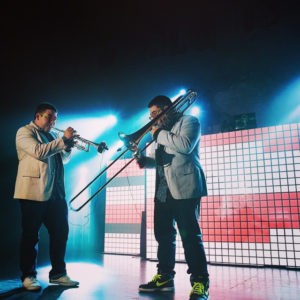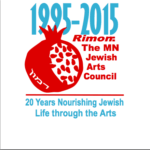Twenty-two year old, Jewish, jazz superstars from Nebraska. That’s not a sentence you hear all that often.
Ezra: There’s definitely not a box that you can check that we fit right into.
Which is very cool. How has your unique background influenced your career?
Adeev: That’s a good question. I think that everyone is kind of a product of their environment and I think we decided to create something out of our environment. Because obviously like you said, you’re naming jazz, Nebraska, Jews…
Ezra: You could even throw foodies in there as well.
Adeev: Yeah, and those really aren’t things that go hand in hand. I think at one point we looked at the time we had in front of us and we said, What are we going to do?
Ezra: It wasn’t like we picked up a horn and we knew. It wasn’t until we met with Wynton [Marsalis] and had a lesson with him that we realized that jazz was the most expressive way for us to relate to people.
Adeev: And I think that we are still developing. We’ve kind of come to the conclusion that it’s never going to end for us. The one thing that has been a constant for us is that it’s always changing.
What was it like growing up in Nebraska? Was there a big difference in the Jewish community in Omaha compared to when you moved to New York in 2012?
Adeev: Oh yeah, well the great thing about Omaha Jews is that they’re kind of everywhere. Tons of Jews from Omaha are in New York. It’s a tight-knit group that’s really helpful to those that move to the city. We just kind of fell into that.
Ezra: Also, we went to Herzl Camp, and those guys are everywhere too. So we move to New York and all of a sudden there’s this other support group we had that we didn’t expect to find. I think if you just compare the Jewish communities in Omaha, which is a small one where everyone knows each other, and New York, where everyone is Jewish but no one talks to each other, it’s pretty drastic. The Jewish community is not something you really rely on in New York where in Omaha you do.
So how does that compare now that you’ve moved to Minneapolis?
Adeev: Here, in the Minneapolis Jewish community, everyone knows everybody and they get together—whether it’s at a synagogue, a play the kids are doing, or sports activities at the J. There’s always something people are doing to relate as a community. In Omaha you don’t really see that as much.
When you think of our generation, jazz isn’t necessarily the first genre of music that comes to mind. How do you guys work to connect with a younger generation?
Adeev: We’ve established a jazz genre that is melodies you’d hear in pop music, covered by the horns instead of the singer. People relate that to jazz, even though it’s not necessarily coming from a John Coltrane or a Miles Davis.
Ezra: I think jazz, for our generation, has a really negative connotation and we are okay with the challenge that presents. On our current album, we’re basically trying to bridge the gap between pop and jazz. Maybe more accurately, we’re bridging the gap between people and jazz. We’re writing it because we want it to be relatable.
So let’s switch gears. You guys mentioned that you’re big foodies. You write the blog double-stuffed.com. How do the Twin Cities stack up as a food city?
Adeev: The Twin Cities are the next big food city and I’ll tell you why…
Ezra: Accessibility.
Adeev: Accessibility.
Ten years ago, when Marcus Samuelsson came here from New York to open Aquavit, Minneapolis was not ready to pay those types of prices. They weren’t ready to acknowledge that food is an art, and now they are. Our good friend, Chef Gavin Kaysen, came from New York where he was executive chef at Cafe Boulud to open Spoon and Stable—
Ezra: And it’s thriving. With places like Revival and Nighthawks, you can easily access great food for a good price without having to worry about a crazy wait.
So what is your favorite Jewish Food?
Ezra: I mean the classic Matzo Ball soup. Even non-Jews love it. People in our band who are not Jewish are always like, “I used to go to this place and get Matzo Ball Soup.” It’s about time a Jewish dish is in the mainstream like that.
Adeev: I’ll piggyback off that and say I probably haven’t had challah I didn’t like. There are definitely drier ones, but I’ve never hated one because even the drier ones can make good french toast the next day.
You guys have a big show coming up on January 7th at the Dakota Jazz Club. How did you get involved with the club?
Adeev: Everyone talks about the Dakota in New York City when they leave to play somewhere else. Basically it was like, How have we not played there? So we played there in September, we sold it out, and they were extremely happy. They invited us back again and here we are January 7th, it’s going to be an amazing time.
What can we expect to see at the show on January 7th?
Ezra: Expect to hear music so fresh you’ll be surprised they call it jazz.




